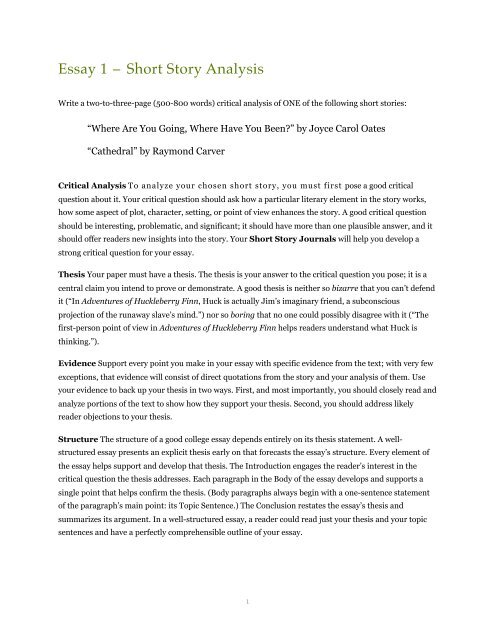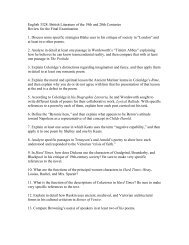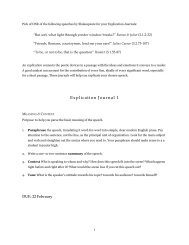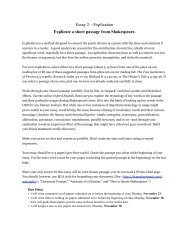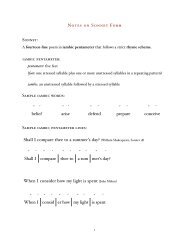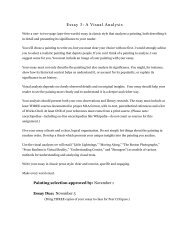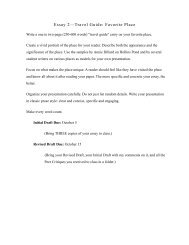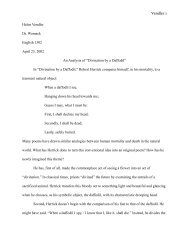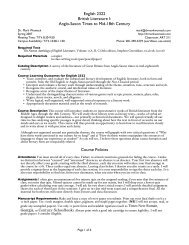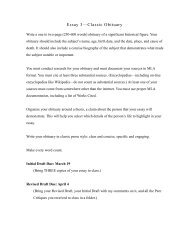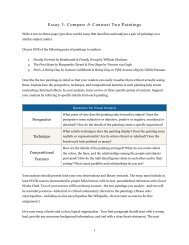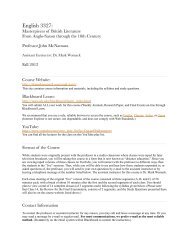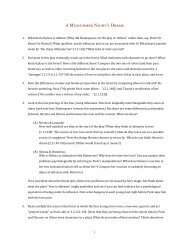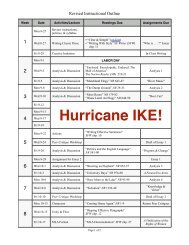Essay 1 â Short Story Analysis - Dr. Mark Womack
Essay 1 â Short Story Analysis - Dr. Mark Womack
Essay 1 â Short Story Analysis - Dr. Mark Womack
Create successful ePaper yourself
Turn your PDF publications into a flip-book with our unique Google optimized e-Paper software.
<strong>Essay</strong> 1 – <strong>Short</strong> <strong>Story</strong> <strong>Analysis</strong><br />
Write a two-to-three-page (500-800 words) critical analysis of ONE of the following short stories:<br />
“Where Are You Going, Where Have You Been?” by Joyce Carol Oates<br />
“Cathedral” by Raymond Carver<br />
Critical <strong>Analysis</strong> To analyze your chosen short story, you must first pose a good critical<br />
question about it. Your critical question should ask how a particular literary element in the story works,<br />
how some aspect of plot, character, setting, or point of view enhances the story. A good critical question<br />
should be interesting, problematic, and significant; it should have more than one plausible answer, and it<br />
should offer readers new insights into the story. Your <strong>Short</strong> <strong>Story</strong> Journals will help you develop a<br />
strong critical question for your essay.<br />
Thesis Your paper must have a thesis. The thesis is your answer to the critical question you pose; it is a<br />
central claim you intend to prove or demonstrate. A good thesis is neither so bizarre that you can’t defend<br />
it (“In Adventures of Huckleberry Finn, Huck is actually Jim’s imaginary friend, a subconscious<br />
projection of the runaway slave’s mind.”) nor so boring that no one could possibly disagree with it (“The<br />
first-person point of view in Adventures of Huckleberry Finn helps readers understand what Huck is<br />
thinking.”).<br />
Evidence Support every point you make in your essay with specific evidence from the text; with very few<br />
exceptions, that evidence will consist of direct quotations from the story and your analysis of them. Use<br />
your evidence to back up your thesis in two ways. First, and most importantly, you should closely read and<br />
analyze portions of the text to show how they support your thesis. Second, you should address likely<br />
reader objections to your thesis.<br />
Structure The structure of a good college essay depends entirely on its thesis statement. A wellstructured<br />
essay presents an explicit thesis early on that forecasts the essay’s structure. Every element of<br />
the essay helps support and develop that thesis. The Introduction engages the reader’s interest in the<br />
critical question the thesis addresses. Each paragraph in the Body of the essay develops and supports a<br />
single point that helps confirm the thesis. (Body paragraphs always begin with a one-sentence statement<br />
of the paragraph’s main point: its Topic Sentence.) The Conclusion restates the essay’s thesis and<br />
summarizes its argument. In a well-structured essay, a reader could read just your thesis and your topic<br />
sentences and have a perfectly comprehensible outline of your essay.<br />
1
English 1302!<br />
<strong>Dr</strong>. <strong>Mark</strong> <strong>Womack</strong><br />
Structure of <strong>Short</strong> <strong>Story</strong> <strong>Analysis</strong><br />
Introduction<br />
(1 paragraph)<br />
Alternate Views<br />
(1 paragraph)<br />
<strong>Analysis</strong><br />
(2-3 paragraphs)<br />
Conclusion<br />
(1 paragraph)<br />
‣ Hooks the reader’s interest.<br />
‣ Introduces the critical question your essay will address.<br />
‣ Ends with a thesis statement (your answer to the question).<br />
‣ Presents possible alternative answers to your critical question.<br />
‣ Briefly responds to alternative answers.<br />
‣ Supports each element of your thesis with a close, careful, and<br />
detailed reading of the story.<br />
‣ Briefly summarizes your analysis.<br />
‣ Returns to the “hook” from the opening paragraph.<br />
Style Make your prose as clear and concise as possible. Don’t waste your time (and mine) trying to sound<br />
impressive. Write, instead, in a conversational voice: the clear, plainspoken, engaging voice of a person<br />
talking about a subject they find interesting. Don’t let your essay run longer than what you have to say.<br />
Make every word count. One sentence that has something to say is better than a paragraph that doesn’t.<br />
Quotations Use quotations from the story to direct the reader’s attention to passages that help support<br />
your thesis. Never quote from the story without discussing what you’re quoting and explaining how the<br />
quotation helps support your argument. Although your only source for this essay will be the text of your<br />
chosen story (anthologized in Portable Legacies) your essay must have a Work Cited page with full<br />
bibliographic information on the text and employ in-text citations and parenthetical references with page<br />
numbers. Use proper MLA style for formatting your document. (See ,<br />
especially “Document Format,” “Anatomy of a Citation,” and “How to Quote Prose.”)<br />
Audience Think of the audience for your essay as an individual, not a vaguely defined group of people.<br />
Imagine a single reader just as intelligent and well-informed as yourself, someone who has read the story<br />
you’re analyzing and expects your essay to provide new, surprising insights into that story. Such a reader<br />
would, or course, find plot summary or definitions of common literary terms unnecessary, tedious, and<br />
perhaps even a little insulting.<br />
<strong>Dr</strong>afts You will develop your essay through multiple drafts. The <strong>Story</strong> Journals will help you develop a<br />
good critical question and a working thesis. Once you have a working thesis, you can make an informal<br />
outline for your essay. (We’ll workshop the outlines in class on February 4.) Your outline will help you<br />
write a First <strong>Dr</strong>aft. Your First <strong>Dr</strong>aft will suck big-time (all first drafts do), but its awfulness will show you<br />
what you need to work on to make the next draft(s) better. On February 8, your fellow students will<br />
assist you in a Peer Review workshop by pointing out just where your draft needs improvement. You will<br />
turn in your Final Revision on February 18.<br />
2
English 1302!<br />
<strong>Dr</strong>. <strong>Mark</strong> <strong>Womack</strong><br />
Optional Revision Conferences I will hold optional 10-minute revision conferences with interested<br />
students on February 15 in CASA 325. Conferences with me on rough drafts of your essay are truly<br />
optional. The conferences are for students who want extra help revising their essays, not for students<br />
trying to impress their instructor or earn brownie points. If you don’t have specific questions about your<br />
draft, don’t sign up for a conference. If you do sign up for a conference, show up on time, bring your First<br />
<strong>Dr</strong>aft, and be ready to tell me about your thesis and how your essay defends it. I, in turn, will point out<br />
any major problems I see in your draft and tell you what I think you need to focus on as you revise it.<br />
Proofreading Before you submit the Final Revision, proofread your essay carefully and thoroughly,<br />
correcting any errors in spelling, punctuation, grammar, and MLA formatting. Slapdash spelling, sloppy<br />
punctuation, semiliterate grammar, or slipshod MLA formatting seriously undermines your credibility as<br />
a writer—your ethos, in rhetorical terms. Therefore, essays with excessive errors in spelling,<br />
punctuation, grammar, or MLA formatting will receive no higher than a D. If you need to<br />
know how to spell a word, look it up in a dictionary. Do not trust a computer to proof your spelling. Spellcheckers<br />
tell you whether you’ve spelled a word correctly, but they can’t tell whether you’ve used the<br />
correct word. (For example: “They proofread there essays carefully” contains a misspelling.) If you have<br />
questions about grammar, punctuation, or MLA format, consult A Writer’s Reference or ask your<br />
instructor.<br />
Evaluation In evaluating your essay, I will consider each of the following: your essay’s thesis, its<br />
structure, its use of evidence, and its prose style. (See the “Grading Criteria for Critical <strong>Essay</strong>s” on the<br />
Syllabus.)<br />
Schedule for <strong>Essay</strong> 1 - <strong>Short</strong> <strong>Story</strong> <strong>Analysis</strong><br />
Outline Workshop February 4<br />
<strong>Short</strong> <strong>Story</strong> Journal 4 (including your Critical Question<br />
and your Informal Outline).<br />
Peer Review Workshop February 8 THREE copies of your First <strong>Dr</strong>aft.<br />
Revision Workshop February 11 Return Completed Peer Reviews.<br />
Revision Conferences February 15 No class. (Optional Revision Conferences in CASA 325.)<br />
Final Revision Due February 18<br />
Revised <strong>Dr</strong>aft, First <strong>Dr</strong>aft, all the Peer Reviews you<br />
received, and all your <strong>Short</strong> <strong>Story</strong> Journals (in a twopocket<br />
folder with your name on the front cover).<br />
3


